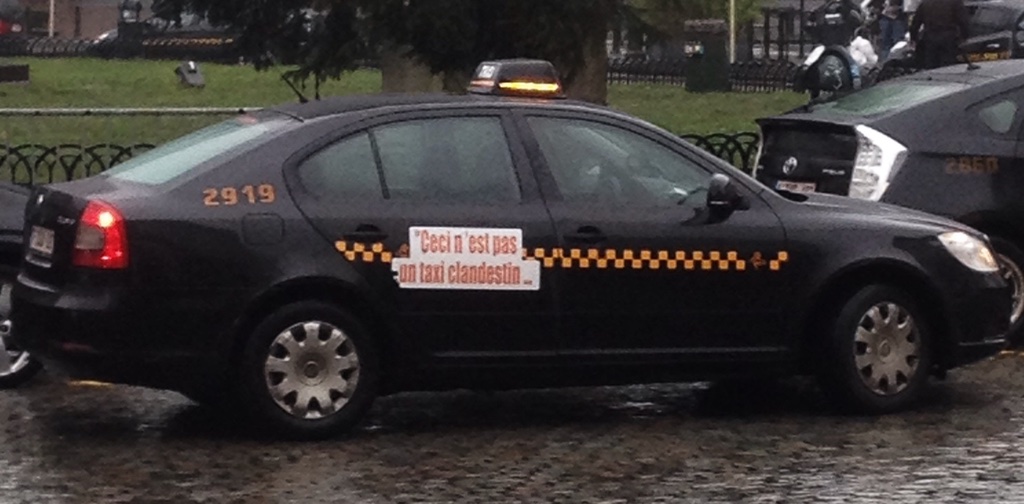
Taxis in Brussels have been been plastered with the slogan “Ceci n’est pas un taxi clandestin” for some months now, in protest at Uber that was allowed in Belgium, then banned, and now – according to this story from Politico – has a reprieve and its legal status will be sorted out.
The argument was that the regular taxis were somehow honest and regulated, and Uber was not, and hence the slogans on the official taxis. Yet the Politico piece quotes Belgian deputy PM Alexander De Croo who says that Brussels taxis actually only declare an average of €25 each a day in income. Clearly a lot of the money the taxis are making is going undeclared. Who is actually clandestin then?
The solution Brussels proposes for Uber therefore strikes me as inherently sensible. The official taxis will be to a certain extent sorted out (they will have to accept credit cards for example), and they will be the only ones allowed to use taxi ranks, taxi lanes, and to be flagged down on the street. They will be the kind of public service orientated taxi service – with higher privileges and higher obligations. Think of them of the black cabs of London.
Uber drivers will be the ones providing the lower level of service – they have to be pre-ordered, and may still be cheaper, and you may as a customer not know what you will get, but the drivers will have to be established as independents, pay taxes, and have Uber as only a secondary source of income – good. Think of Uber as like minicabs in London.
The compromise here strikes me as inherently sensible. Whether you like or loathe Uber as a firm is not the right way to look at this – mobile internet, and different ways to establish trust and social norms, can change the way business is conducted. Law to protect the old business model of taxi firms is not the solution here; regulation of companies like Uber, and some organisation of the market is. Brussels has got the balance right here I think.
(Please note: I have never used Uber, and do not intend to do so. I use taxis on average about twice a year, when there is simply no other way to get to my destination. So I am not writing this from the point of view of someone trying to defend something that matters to me personally. It doesn’t.)
[UPDATE 22.4.2015, 1600] More details of the practical aspects of the new taxi regulation from Pascal de Smet here (thanks @BrusselsGeek for the tip)














I have conflicted views about Uber. It’s a bit like Amazon, a company I really should hate, but actually have to use as the competition simply don’t come close. Interestingly, with neither prices is the deciding fact, instead it’s speed, ease and service.
I live in Leeds, but am actually closer to Wakefield city centre. Leeds was the third city and Wakefield then fourth city in the UK to get Uber (after London and Manchester). I haven’t used Uber at home as I feel morally I should support the existing providers. But they really don’t help themselves or offer anything other than I feel it’s the right thing to do. Uber offer me ability to pay automatically by card so just jump out when I’m rushing for a train, the security of knowing where my car is and when it will get to me, and little extras like a charging cable for my phone and complimentary mints. My traditional taxi company offers me none of these things. If I’ve no cash in my wallet (a frequent occurrence and I live in a village with no cash machine) I’m stuffed.
However, I do use Uber when I’m travelling. I enjoy using local public transport, but it’s not always possible and then Uber is now my first choice. I don’t have to figure out the rates for local taxis or have the right money (often foreign notes I’ve got are too high a denomination). It’s easy and I can trust it, unlike a taxi in a foreign city where I don’t know how regulated they are or what a fair fare should be. With Uber I know it’s roughly competitive and I can get an estimate in advance, as well as looking at the route.
But Uber just does so much wrong such as the way it recruits drivers and intimidates the competition, Before it launched in Leeds I was advocating that the city council’s licensing committee tried to make Leeds Uber-free by pushing our existing taxi companies to get their act together and modernise. It didn’t happen. But Uber does need a licence like every other private hire company operating in the city.
I think the notion that there was some kind of “protection of an old business model” is questionable. It’s questionable not the least because it’s Uber’s standard response to any and all legal problems, regardless of what the actual situation is.
Mobile internet, for example, is clearly not a factor in Germany – it has been around for Taxis years before Uber, yet still is regurgitated time and again as an argument for Uber, including in Germany.
Likewise the trope of entrepreneurialism vs. monopolies.
There was a nice article on HBR.org on Uber’s earlier antics in Germany: https://hbr.org/2014/09/to-succeed-in-germany-uber-needs-to-grow-up
Interestingly, I’ve heard that Uber has recently resigned itself to pay for its drivers’ “Personenbeförderungsschein”. We’ll see what that, and other regulations, will do to their business model. For me, the chief concern is not the least who pays when the proverbial feces hits the ventilator – because most standard driver’s insurances do not cover passengers transported commercially. Not sure what the situation in Belgium is on that aspect.